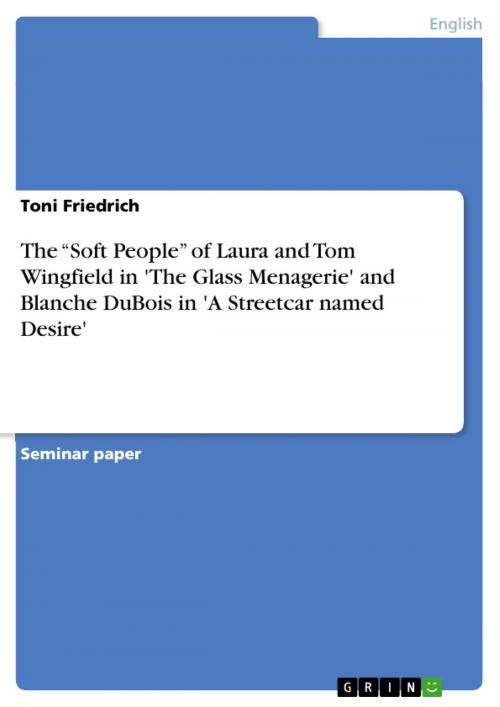The 'Soft People' of Laura and Tom Wingfield in 'The Glass Menagerie' and Blanche DuBois in 'A Streetcar named Desire'
Nonfiction, Entertainment, Drama, Anthologies| Author: | Toni Friedrich | ISBN: | 9783656094289 |
| Publisher: | GRIN Verlag | Publication: | January 3, 2012 |
| Imprint: | GRIN Verlag | Language: | English |
| Author: | Toni Friedrich |
| ISBN: | 9783656094289 |
| Publisher: | GRIN Verlag |
| Publication: | January 3, 2012 |
| Imprint: | GRIN Verlag |
| Language: | English |
Seminar paper from the year 2010 in the subject American Studies - Literature, grade: 1,0, Martin Luther University, language: English, abstract: 'I´ve run for protection .... And so the soft people have got to - shimmer and glow - put a - paper lantern over the light. ... But I´m scared now - awf`ly [sic] scared.' These lines of self-revelation by Blanche DuBois, the protagonist of A Streetcar Named Desire, go hand in hand with Maggie´s words of consolation at the end of Cat on a Hot Tin Roof: 'Oh, you weak, beautiful people who give up with such grace. What you need is someone to take hold of you - gently, with love, and hand your life back to you, like something gold you let go of ....' Both describe one of the most crucial, if not the most central, elements of Tennessee Williams literary work: the concept of fragility and need for protection within a universe of hostility - the notion of 'soft people.' This term paper is intended to elucidate on the topic of 'soft people' within Tennessee Williams most important plays, The Glass Menagerie and A Streetcar Named Desire. It will try to investigate the following questions: Why did the theme 'soft people' gain such prominence within Williams` work? What parallels can be detected between the author´s life and aspects of his characters? What makes Laura and Tom Wingfield, on the one hand, and Blanche DuBois, on the other hand, belong to this category? What misery do these characters share? What signifies their softness in any individual case, and what determines their fate at the end of the plays? In order to answer these questions, a thorough look into the characters and metaphors of the plays - with help of the plays - will be provided, as well as secondary literature of a wide range of literary scholars consulted. To achieve a high and detailed level of understanding of Tennessee Williams` allusions, tropes and allegories, an examination of the playwright's personal life will precede the analysis of his 'soft people.' Moreover, to attain a profound exploration of the singularity of Tom´s situation - with respect to him being trapped within a society of mediocrity and sedation - the ideas and postulations of the Frankfurt School, the so called critical theory of industrial society, will be discussed.
Seminar paper from the year 2010 in the subject American Studies - Literature, grade: 1,0, Martin Luther University, language: English, abstract: 'I´ve run for protection .... And so the soft people have got to - shimmer and glow - put a - paper lantern over the light. ... But I´m scared now - awf`ly [sic] scared.' These lines of self-revelation by Blanche DuBois, the protagonist of A Streetcar Named Desire, go hand in hand with Maggie´s words of consolation at the end of Cat on a Hot Tin Roof: 'Oh, you weak, beautiful people who give up with such grace. What you need is someone to take hold of you - gently, with love, and hand your life back to you, like something gold you let go of ....' Both describe one of the most crucial, if not the most central, elements of Tennessee Williams literary work: the concept of fragility and need for protection within a universe of hostility - the notion of 'soft people.' This term paper is intended to elucidate on the topic of 'soft people' within Tennessee Williams most important plays, The Glass Menagerie and A Streetcar Named Desire. It will try to investigate the following questions: Why did the theme 'soft people' gain such prominence within Williams` work? What parallels can be detected between the author´s life and aspects of his characters? What makes Laura and Tom Wingfield, on the one hand, and Blanche DuBois, on the other hand, belong to this category? What misery do these characters share? What signifies their softness in any individual case, and what determines their fate at the end of the plays? In order to answer these questions, a thorough look into the characters and metaphors of the plays - with help of the plays - will be provided, as well as secondary literature of a wide range of literary scholars consulted. To achieve a high and detailed level of understanding of Tennessee Williams` allusions, tropes and allegories, an examination of the playwright's personal life will precede the analysis of his 'soft people.' Moreover, to attain a profound exploration of the singularity of Tom´s situation - with respect to him being trapped within a society of mediocrity and sedation - the ideas and postulations of the Frankfurt School, the so called critical theory of industrial society, will be discussed.















